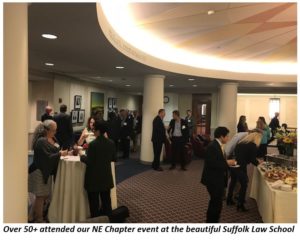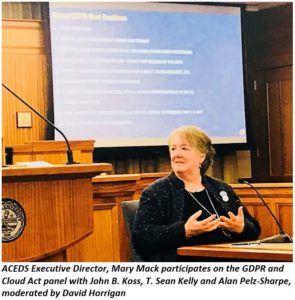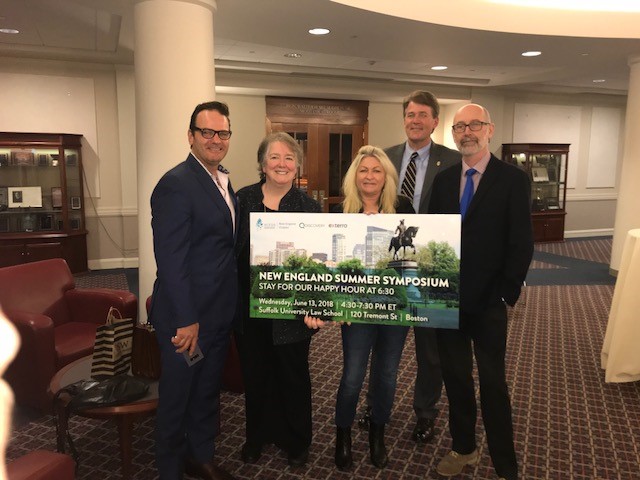Featured photo: Brian Moretti, Mary Mack, Kaylee Walstad, David Horrigan and Alan Pelz-Sharpe
Colleen Freeman, Director for FTI Consulting and President of the ACEDS New England Chapter, introduced their Summer Symposium on  Wednesday, June 13 at Suffolk University Law School where David Horrigan, Discovery Counsel and Legal Education Director for Relativity, moderated an esteemed panel of legal and corporate experts to provide background on the legal issues and analysis of the business implications surrounding GDPR best practices, United States vs. Microsoft, and the CLOUD Act from an E-Discovery Perspective.
Wednesday, June 13 at Suffolk University Law School where David Horrigan, Discovery Counsel and Legal Education Director for Relativity, moderated an esteemed panel of legal and corporate experts to provide background on the legal issues and analysis of the business implications surrounding GDPR best practices, United States vs. Microsoft, and the CLOUD Act from an E-Discovery Perspective.
The group participated in an interactive discussion answering questions like….
- The fines for GDPR are real, so why aren’t companies stepping up?
- Data Privacy is a big concern……but why is it an expectation for the US?
- What does the CLOUD Act describe/do, especially regarding requests by foreign governments for US data?
- What happened to the Microsoft case, and what cases are pending after GDPR?
- What are the GDPR Fine Factors to mitigate against a 4% of global turnover fine – article 83?
- Is Discovery practice changing due to the GDPR?
- What is the most important GDPR best practice?
 The panel included John B. Koss, Special Counsel, E-Discovery for Mintz Levin, who shared his thoughts on GDPR; T. Sean Kelly, Senior Director of FTI Consulting, who provided insights into corporate e-discovery; Alan Pelz-Sharpe, Founder and Principal Analyst of Deep Analysis, who contributed from his experience in international business and analysis from a data privacy perspective and Mary Mack, Executive Director of ACEDS, who shared her thoughts on GDPR specific to eDiscovery workflow.
The panel included John B. Koss, Special Counsel, E-Discovery for Mintz Levin, who shared his thoughts on GDPR; T. Sean Kelly, Senior Director of FTI Consulting, who provided insights into corporate e-discovery; Alan Pelz-Sharpe, Founder and Principal Analyst of Deep Analysis, who contributed from his experience in international business and analysis from a data privacy perspective and Mary Mack, Executive Director of ACEDS, who shared her thoughts on GDPR specific to eDiscovery workflow.
A significant portion of the discussion included a deep dive by John Koss through the litigation exception and cross border data transfer. Contrasting past practice with the present GDPR, John posited that the practice of waiting for international data until after the scheduling order, or a motion to compel, is giving way toward informal cooperation before a court order as the GDPR sets up different tracks than the Safe Harbor/Privacy Shield era.
A Chapter reception followed the event with over 50 attendees. ACEDS is so thankful to our  sponsors Exterro and QDiscovery who made the event possible. ACEDS also thanks Brian Moretti of Compliance Discovery Services who added his aunt’s famous cupcakes decorated in ACEDS colors to the festivities.
sponsors Exterro and QDiscovery who made the event possible. ACEDS also thanks Brian Moretti of Compliance Discovery Services who added his aunt’s famous cupcakes decorated in ACEDS colors to the festivities.
ACEDS also sends a thank you to Kaylee Walstad (@kayleewalstad) and the Suffolk team for livestreaming and recording, and Katie Saylor for her contribution to this report, and photography. Thank you to the New England Chapter board and members for creating and hosting this timely symposium.
For answers to the questions above, view the event video here
View the event description here
View the live-stream here
GDPR Best Practices Shared:
- Know your data
- Practice data protection by design and default
- Establish a data breach action plan, including notification procedures
- Retain a data protection officer – event if not required by the GDRP
- Retain a consumer data ombudsman for subject access requests, ect.
- Retain consultants for GDPR compliance
- If your organization is outside the EU, retain a representative in the EU
- Educate your team
- Avail yourself of resources such as the ICO, Article 29 Working Party, and IAPP
- Avail yourself of ACEDS resources
